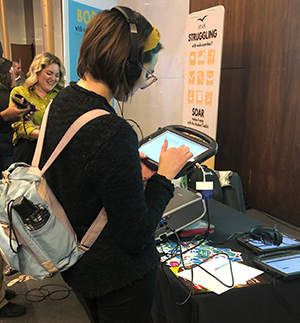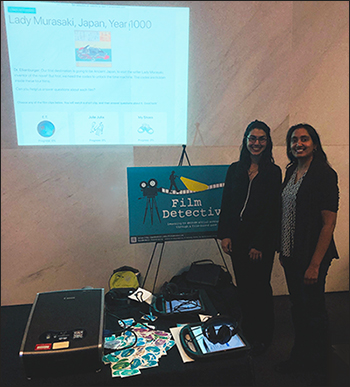
Elementary school teachers seemed particularly excited about Film Detective, a game to help adolescents on the autism spectrum learn to decode social scenarios, at the 7th annual ED Games Expo Jan. 9 in Washington, D.C.
“They liked how engaging the game is, using television and movie clips as our instructional content,” said Maithilee Kunda, assistant professor of computer science and computer engineering. “They liked how the game gets players to try to answer questions about the motivations of the characters in each video.”
Kunda and Roxanne Rashedi, a postdoctoral research fellow, were in the capitol to demo a prototype of the new educational film-based game they are developing to teach theory of mind and social reasoning skills.

Players will teach a virtual agent to ascribe mental states— beliefs, desires and emotions—to other people and to use these concepts to interpret others’ actions, said Kunda, director of Vanderbilt’s Laboratory for Artificial Intelligence and Visual Analogical Systems and a fellow of Vanderbilt’s Frist Center for Autism and Innovation.
Film Detective was one of 149 exhibits in the John F. Kennedy Center for Performing Arts, in a terrace-level room overlooking the Potomac River. ED Games Expo is a showcase of government supported educational learning games and technologies sponsored by the U.S. Department of Education’s Institute of Education Sciences.
Every year, the ED Games Expo promotes game-based learning through the display of educational games and technology. Topics include early learning, science, engineering, math, reading, social studies, social skills, and to support students with or at risk for disabilities. Exhibitors include university researchers, nonprofits, game developers and game companies.
Game-based learning is gaining popularity in education as more young people and adults learn from games both in and out of the classroom. Well-designed games motivate students to actively engage in content that relates to coursework and master challenging tasks designed to sharpen critical thinking and problem solving, strengthen life skills and support employment.
Film Detective is under development through a partnership between the Vanderbilt University School of Engineering and the Vanderbilt University Medical Center’s Treatment and Research Institute for Autism Spectrum Disorders (TRIAD), part of the Vanderbilt Kennedy Center for Research on Human Development. Film Detective is based on an adaptation of the Betty’s Brain science education platform, also developed at the School of Engineering.

Kunda, Rashedi and research engineer Marian Rushdy, who developed the prototype used at ED Games, collaborate with Gautam Biswas, Cornelius Vanderbilt Professor of Engineering, Pablo Juarez, TRIAD director, and Zachary Warren, executive director of TRIAD.
The Expo is held from 5-8 p.m. and parents are encouraged to bring children after school to play and meet the developers of games designed with cutting-edge technologies—such as virtual reality, augmented reality, maker tools, automated tutors and role-playing games.
“Our booth visitors liked how the game gets players to answer questions about characters’ motivations. Teachers thought it would be a great tool for students on the autism spectrum,” said Kunda, whose work in artificial intelligence in the area of cognitive systems, looks at how visual thinking contributes to learning and intelligent behavior, with a focus on applications for individuals on the autism spectrum.
A Smithsonian exhibitor who has a similar game with historical photos to teach kids who is in the photo, what they’re doing and why, was excited by how Film Detective does something similar but with movies. “Getting kids to really analyze and understand everything that’s happening in a single video—he thought that was a great way for kids to learn,” she said.
The Film Detective project is supported by an Institute of Education Sciences/National Center for Special Education Research grant.
Contact: Brenda Ellis, 615 343-6314
brenda.ellis@vanderbilt.edu